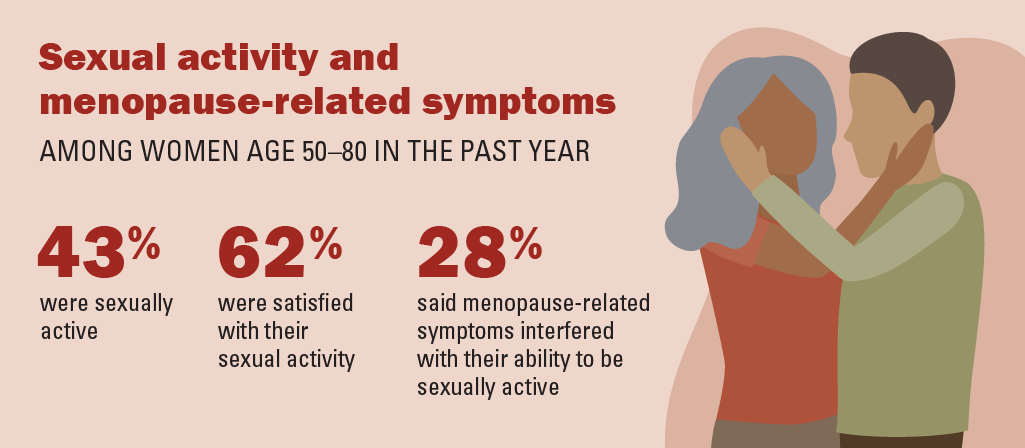
Sex and intimacy are an important part of many older women’s lives, but aging-related changes, including menopause, can negatively affect sexual activity. While menopause is defined as the absence of a period for at least a year and the average age of menopause is around 50, the transition to menopause and symptoms of menopause can last for many years. Early in 2022, the National Poll on Healthy Aging asked a national sample of women age 50–80 about sexual activity, intimacy, and symptoms commonly associated with menopause.
Sexual activity and intimacy
Two in five women age 50–80 (43%) said they have been sexually active in the past year (defined as caressing, foreplay, masturbation, or intercourse). Women age 50–64 were more likely to report being sexually active than those age 65–80 (53% vs. 30%), as were those who were married or partnered compared with those who were not (58% vs. 26%).
Overall, 62% of women age 50–80 reported being satisfied (29% very, 33% somewhat) with their sexual activity in the past year. Women were more likely to be satisfied with their sexual activity if they reported being sexually active than if they did not (74% vs. 52%). Women who reported excellent, very good, or good physical health were more likely to report being very satisfied with their sexual activity compared with women in fair or poor physical health (66% vs. 47%), as were women in excellent, very good, or good mental health compared with women in fair or poor mental health (65% vs. 36%).
Among older women who had a spouse or partner and were sexually active, 75% reported being satisfied (38% very, 37% somewhat) with the intimacy in their relationship in the past year. Among women who had a spouse or partner who were not sexually active, 50% were satisfied (24% very, 26% somewhat) with the intimacy in their relationship.

Menopause-related symptoms and sexual activity
Overall, more than four in five women age 50–80 (84%) reported experiencing symptoms commonly associated with menopause (i.e., menopause-related symptoms) in the past year, including sleep problems (56%), weight gain/slow metabolism (55%), reduced libido/sexual drive (48%), hot flashes/night sweats (41%), and mood swings/irritability (38%). Less commonly reported menopause-related symptoms included urinary tract infections (16%), pelvic/bladder pain (13%), and menstrual changes (7%). All menopause-related symptoms except urinary tract infections were more common among women age 50–64 than women age 65–80.
About half of older women (49%) said they experienced one to three menopause-related symptoms in the past year, while 35% had four or more symptoms. Women age 50–64 were more likely to report experiencing at least one menopause-related symptom compared with those age 65–80 (88% vs. 78%).
Nearly one in three women age 50–80 (30%) said menopause-related symptoms interfered (5% quite a bit, 25% somewhat) with their day-to-day life. About one in four (27%) said their symptoms interfered (11% a lot, 16% somewhat) with their romantic relationships and 21% said their symptoms interfered (5% a lot, 16% somewhat) with their self-confidence.
Overall, about one in four older women (28%) reported that their menopause-related symptoms interfered (14% a lot, 14% somewhat) with their ability to be sexually active. Women age 50–64 were more likely to report that their menopause-related symptoms interfered with their ability to be sexually active compared with those age 65–80 (32% vs. 22%), as were women in fair or poor physical or mental health compared with women with better self-reported health. Women who experienced menopause-related symptoms were less likely to report satisfaction with their sexual activity than those without symptoms (60% vs. 73%).
One in six older women (17%) said other health issues interfered with their ability to be sexually active. Women without other health issues were more likely to report satisfaction with their sexual activity (69% vs. 34%) and more likely to report satisfaction with their intimacy with their partner (74% vs. 50%) than those with other health issues. About one in four women age 50–80 (26%) said their partner’s health interfered with their ability to be sexually active.
Conversations with health care providers
Among women who experienced menopause-related symptoms, 54% had talked with their health care provider about them. Over two in five women who experienced symptoms (44%) said they discussed potential treatments for their symptoms with their health care provider; among those women, 64% received treatment. Of those who received treatment, 33% thought their symptoms were managed very well, 55% somewhat well, and 12% not very well or at all.
Implications
In this poll, 43% of older women reported being sexually active in the past year. While many reported being satisfied with their sexual activity and intimacy, many others were not, and this was often due to health challenges.
Menopause-related symptoms were common among women age 50–80, with the majority experiencing at least one such symptom in the past year. While menopause-related symptoms were more common among women age 50–64, this poll found that many women age 65–80 also experience menopause-related symptoms. For women of all ages, these symptoms can negatively affect both daily activities and sexual activity. Specifically, many women reported that menopause-related symptoms interfered with their romantic relationships and their ability to be sexually active; women with such symptoms were more likely to report feeling dissatisfied with sexual activity and with the intimacy in their relationship.
Because of the high prevalence and negative impact of menopause-related symptoms among older women — even several years after they may have gone through menopause — it is important for clinicians to routinely ask about the presence of such symptoms. Additionally, it is important for older women who have them to know that their experience is not uncommon.
While not all menopause-related symptoms require treatment, certain health care services can be helpful for those who experience at least moderate to severe symptoms or find that these symptoms are affecting important aspects of their lives. Just over half of women with menopause-related symptoms in this poll discussed their symptoms with a health care provider. Among women who discussed treatment, about two in three received it, and most of them reported their symptoms were well managed. Women with bothersome symptoms commonly associated with menopause should discuss their concerns with their primary care provider, gynecologist, or another health care specialist so that they can be informed about treatment options appropriate for their needs and goals.
Data Source and Methods
This National Poll on Healthy Aging report presents findings from a nationally representative household survey conducted exclusively by NORC at the University of Chicago for the University of Michigan’s Institute for Healthcare Policy and Innovation. National Poll on Healthy Aging surveys are conducted using NORC’s AmeriSpeak probability-based panel. This survey module was administered online and via phone between January and March 2022 to a randomly selected, stratified group of U.S. adults age 50–80 (n=2,277). The sample was subsequently weighted to reflect population figures from the U.S. Census Bureau. The completion rate was 68% among panel members contacted to participate. This report focuses on questions asked of the 1,225 women who completed the survey. The margin of error is ±2 to 4 percentage points for questions asked of all women and higher among subgroups.
Findings from the National Poll on Healthy Aging do not represent the opinions of the University of Michigan. The University of Michigan reserves all rights over this material.
Read other National Poll on Healthy Aging reports and about the poll's Michigan findings, and learn about the poll methodology.
Citation
Morgan D, Singer D, Solway E, Kirch M, Kullgren J, Smith E, Malani P. Women’s Health: Sex, Intimacy, and Menopause. University of Michigan National Poll on Healthy Aging. May/June 2022. Available at: https://dx.doi.org/10.7302/4451